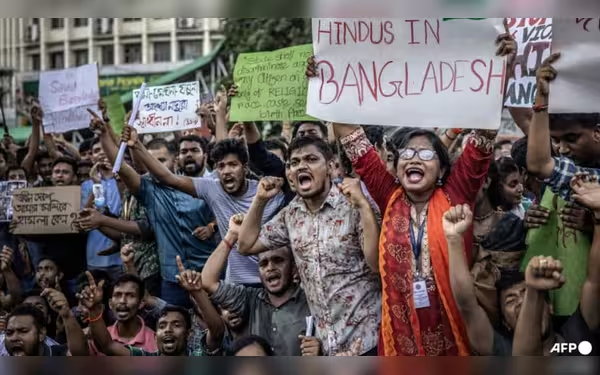Monday, December 23, 2024 10:19 AM
Bangladesh Hindu Monk Arrest Sparks Outcry
- Hindu monk Chinmoy Krishna Das arrested in Dhaka.
- Protests for Hindu rights escalate amid political turmoil.
- Religious tensions rise following recent political changes.
 Image Credits: channelnewsasia
Image Credits: channelnewsasiaThe arrest of Hindu monk Chinmoy Krishna Das in Bangladesh raises concerns over minority rights amid escalating religious tensions.
In recent developments in Bangladesh, the arrest of a prominent Hindu monk has sparked significant attention and concern regarding the treatment of minority groups in the country. Chinmoy Krishna Das Brahmachari, a vocal leader of a newly-formed Hindu organization, was taken into custody by police in Dhaka on November 25. This arrest comes in the wake of ongoing protests advocating for the rights and protection of Hindus, who represent a minority in the predominantly Muslim nation.
The backdrop of this situation is marked by a turbulent political climate in Bangladesh, a country of approximately 170 million people. Following a student-led revolution in August that resulted in the ousting of long-time Prime Minister Sheikh Hasina, religious tensions have escalated. Many Hindus, perceived as supporters of Hasina's regime, have faced reprisals, while Islamist groups have begun to assert their presence more aggressively.
Chinmoy Krishna Das Brahmachari has been a central figure in these protests, leading rallies that condemn what his group describes as atrocities against Hindus. His arrest was confirmed by Dhaka police spokesman Talebur Rahman, although specific charges have not been disclosed. However, it is known that a case was filed against him in October after he led a large demonstration in Chittagong, where he was accused of disrespecting the national flag.
The situation raises important questions about the state of religious freedom and minority rights in Bangladesh. As tensions continue to simmer, the actions of both Hindu and Islamist groups reflect a broader struggle for identity and recognition in a rapidly changing political landscape. The arrest of Brahmachari may serve as a flashpoint, igniting further protests and counter-demonstrations as communities grapple with their place in society.
The arrest of Chinmoy Krishna Das Brahmachari highlights the fragile state of religious relations in Bangladesh. As the country navigates its political upheaval, the treatment of minority groups will remain a critical issue. It is essential for all citizens, regardless of their faith, to advocate for a society where everyone can coexist peacefully and with dignity. The unfolding events will undoubtedly shape the future of religious harmony in Bangladesh, making it imperative for all stakeholders to engage in constructive dialogue and seek solutions that promote unity rather than division.













